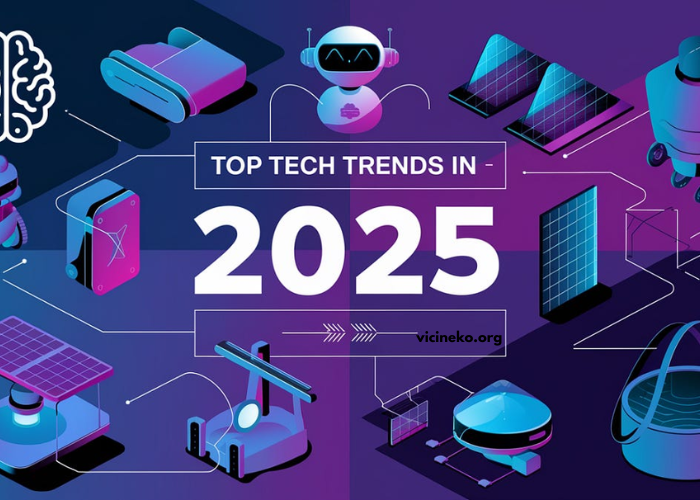Innovation is a driving force behind modern society, pushing boundaries and transforming industries. As technology continues to evolve at an unprecedented rate, the emergence of new advancements promises to reshape how we live, work, and interact with the world. In this article, we will explore some of the most promising and groundbreaking technologies that are likely to play a pivotal role in the next wave of innovation. From artificial intelligence to quantum computing, the future of technology is both exciting and full of potential.
The Rise of Artificial Intelligence
Artificial intelligence (AI) has been a hot topic for many years, but it’s now reaching new levels of sophistication and practical application. AI is set to revolutionize industries from healthcare to finance, and its potential seems almost limitless.
AI in Healthcare: Precision and Personalization
One of the most exciting applications of AI is in healthcare. With the ability to process vast amounts of data, AI can assist in diagnosing diseases, predicting outcomes, and personalizing treatment plans. Machine learning algorithms can analyze medical records, genetic data, and imaging scans, identifying patterns that might otherwise go unnoticed by human doctors. This can lead to more accurate diagnoses and tailored treatment options, ultimately improving patient outcomes.
Moreover, AI-powered tools such as chatbots and virtual health assistants are transforming patient interactions. These tools can provide real-time support, answer questions, and guide patients through their healthcare journey, reducing the burden on healthcare providers and improving patient engagement.
AI in Business: Automation and Decision-Making
In the business world, AI is increasingly being used to automate routine tasks, freeing up human workers for more complex and strategic activities. AI-powered tools can streamline processes such as data entry, customer service, and inventory management, resulting in significant cost savings and operational efficiency.
In addition, AI is helping companies make better decisions. By analyzing vast amounts of data, AI algorithms can uncover insights that might otherwise be missed. These insights can inform everything from product development to marketing strategies, enabling businesses to stay competitive in a fast-paced market.
Quantum Computing: The Next Frontier
Quantum computing is another area of emerging technology that has the potential to revolutionize industries. Unlike traditional computers, which process information in binary (0s and 1s), quantum computers use qubits, which can represent both 0 and 1 simultaneously. This allows quantum computers to perform complex calculations at an exponentially faster rate than classical computers.
Quantum Computing in Cryptography and Cybersecurity
One of the most promising applications of quantum computing is in the field of cryptography. Today’s encryption methods rely on the difficulty of factoring large numbers, but quantum computers could potentially break these encryption algorithms in a matter of seconds. This has sparked a race to develop new quantum-resistant encryption methods that can withstand the power of quantum computers.
At the same time, quantum computing also holds the potential to improve cybersecurity. Quantum algorithms could be used to detect and prevent cyberattacks more effectively, creating a more secure digital landscape.
Quantum Computing in Drug Discovery and Materials Science
Quantum computing’s ability to simulate molecular interactions with unprecedented accuracy could revolutionize industries such as pharmaceuticals and materials science. Researchers could use quantum computers to model complex molecules, accelerating the process of drug discovery and enabling the development of new treatments for diseases that are currently difficult to cure.
In materials science, quantum computing could lead to the creation of novel materials with unique properties. This could have far-reaching implications for industries such as electronics, energy, and manufacturing, driving innovation and improving the performance of products and systems.
5G and Beyond: Transforming Connectivity
5G technology is already making waves around the world, promising faster internet speeds, lower latency, and improved connectivity. However, we are only scratching the surface of what 5G can do. In the near future, 5G will enable the widespread adoption of the Internet of Things (IoT), smart cities, and autonomous vehicles.
5G and the Internet of Things (IoT)
The IoT is a network of interconnected devices that communicate and share data with each other. From smart thermostats to wearable fitness trackers, IoT devices are becoming an integral part of our daily lives. With 5G’s faster speeds and lower latency, the IoT will become even more efficient, with real-time data exchange and improved device coordination.
In smart cities, 5G-powered IoT networks will enable everything from intelligent traffic management to predictive maintenance of infrastructure. This will not only enhance the quality of life for citizens but also reduce operational costs and environmental impact.
5G and Autonomous Vehicles
5G will play a crucial role in the development of autonomous vehicles, which rely on constant communication between vehicles, infrastructure, and pedestrians. The low latency of 5G networks will enable real-time data exchange, allowing self-driving cars to make split-second decisions and navigate complex environments with greater safety and accuracy.
Additionally, 5G will allow for the development of remote vehicle control and advanced driver-assistance systems (ADAS), further enhancing the safety and functionality of autonomous vehicles.
Blockchain Technology: Beyond Cryptocurrency
Blockchain technology gained widespread attention through its association with cryptocurrencies like Bitcoin, but its potential extends far beyond digital currencies. Blockchain’s decentralized and secure nature makes it ideal for a wide range of applications across various industries.
Blockchain in Supply Chain Management
One of the most promising uses of blockchain is in supply chain management. Blockchain’s ability to provide transparent, immutable records of transactions makes it an ideal solution for tracking goods as they move through the supply chain. Companies can use blockchain to verify the authenticity of products, ensure ethical sourcing, and improve inventory management.
By providing a transparent and secure record of transactions, blockchain can reduce fraud, improve efficiency, and enhance trust between businesses and consumers.
Blockchain in Healthcare and Data Security
In healthcare, blockchain could provide a secure and decentralized way to store and share patient data. This would address concerns about data privacy and security, allowing patients to control access to their medical records while still enabling healthcare providers to share information when necessary.
Blockchain’s tamper-proof nature also makes it an ideal solution for securing sensitive data in various sectors, from finance to government. By eliminating the need for a central authority, blockchain reduces the risk of data breaches and ensures that information remains secure and accessible.
The Metaverse: A New Digital Reality
The metaverse is an emerging concept that envisions a virtual world where people can interact, socialize, and conduct business in real-time, much like they do in the physical world. Powered by technologies such as virtual reality (VR), augmented reality (AR), and blockchain, the metaverse has the potential to redefine how we experience entertainment, work, and social interactions.
Virtual Reality and Augmented Reality in the Metaverse
Virtual reality (VR) and augmented reality (AR) are key technologies driving the development of the metaverse. VR creates fully immersive digital environments, while AR overlays digital content onto the physical world. Together, these technologies allow users to interact with digital objects and people in new and exciting ways.
In the metaverse, users can attend virtual meetings, socialize with friends, or explore virtual worlds. Businesses can use the metaverse for marketing, training, and product demonstrations, while educators can create immersive learning experiences for students.
Blockchain and Digital Economy in the Metaverse
Blockchain technology also plays a crucial role in the metaverse, enabling the creation of digital assets, such as virtual real estate and NFTs (non-fungible tokens). These assets can be bought, sold, and traded within the metaverse, creating a new digital economy.
The metaverse has the potential to open up new avenues for commerce, entertainment, and social interaction, but it also raises important questions about privacy, security, and the ethical implications of a fully digital existence.
Sustainability and Green Tech: Innovations for a Better Future
As concerns about climate change and environmental degradation grow, the demand for sustainable technologies has never been greater. Green tech, which refers to innovations that aim to reduce environmental impact, is becoming a key focus for both governments and businesses.
Renewable Energy Technologies
Renewable energy technologies, such as solar, wind, and hydropower, are at the forefront of the push for sustainability. These technologies are becoming more efficient and cost-effective, making it easier for individuals and businesses to transition to clean energy sources.
In addition, advancements in energy storage, such as battery technology, are making it possible to store renewable energy for use during periods of low production. This will help to address the intermittent nature of renewable energy sources and enable a more reliable and resilient energy grid.
Sustainable Agriculture and Food Production
Sustainable agriculture is another area of focus for green tech innovation. Precision farming techniques, such as drone monitoring and AI-powered data analysis, are helping farmers optimize crop yields while reducing resource consumption. In addition, lab-grown meat and plant-based food alternatives are gaining popularity as more sustainable options for feeding a growing global population.
Conclusion: A Future of Endless Possibilities
The technologies discussed in this article represent just a fraction of what’s on the horizon. As innovation continues to accelerate, new breakthroughs will emerge, further transforming our lives and the world around us. Whether it’s AI revolutionizing healthcare, quantum computing unlocking new possibilities, or the metaverse creating immersive digital experiences, the future of technology holds limitless potential.
As we look to the future, it’s important to remain mindful of the ethical, social, and environmental implications of these innovations. Responsible development and thoughtful implementation will be crucial to ensuring that the next wave of technological advancements benefits all of humanity.
With emerging technologies constantly reshaping our world, one thing is clear: the next chapter of innovation is just beginning.





